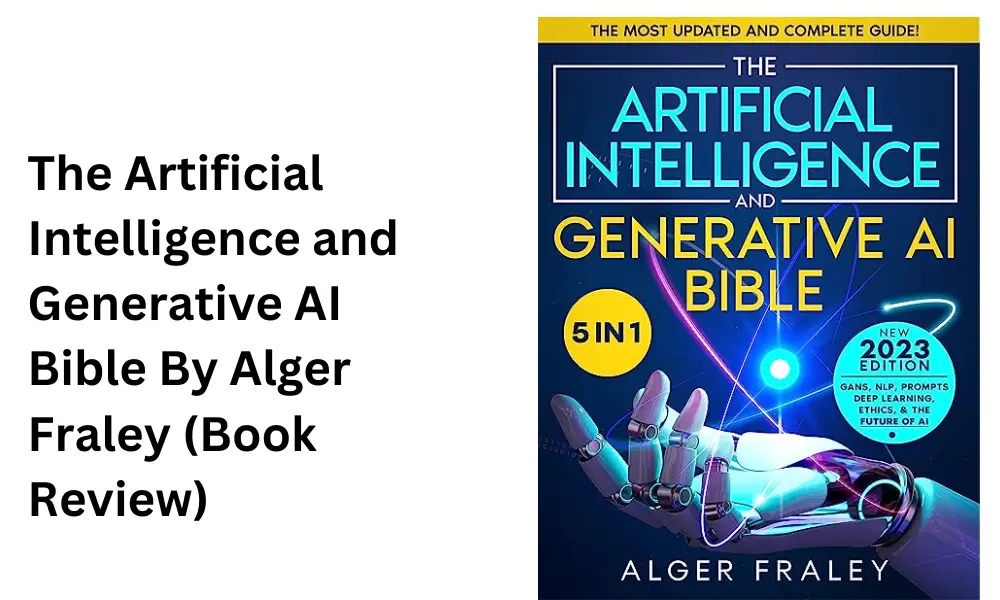The Artificial Intelligence and Generative AI Bible: [5 in 1] The Most Updated and Complete Guide | From Understanding the Basics to Delving into GANs, NLP, Prompts, Deep Learning, and Ethics of AI
Table of Contents
Introduction
In the rapidly evolving landscape of artificial intelligence (AI), understanding the fundamentals and exploring advanced techniques can be a daunting task.
The Artificial Intelligence and Generative AI Bible by Alger Fraley, a comprehensive guide that promises to take readers on a transformative journey through the world of AI and Generative AI. With a wealth of information covering AI basics, deep learning, natural language processing (NLP), generative AI, ethics, and more, this book aims to empower readers to harness the power of AI for unprecedented breakthroughs.
Book Summary
The Artificial Intelligence and Generative AI Bible is a 5-in-1 guide that encompasses a wide range of topics related to AI. From providing insights into AI basics to delving into advanced concepts like Generative Adversarial Networks (GANs) and human-AI collaboration in creative AI, the book offers a holistic approach to AI education. It covers real-world case studies, practical applications of AI across various industries, and ethical considerations surrounding the use of AI technologies.
Book Information
Title: The Artificial Intelligence and Generative AI Bible\
Author: Alger Fraley
Publisher: AlgoRay Publishing
Publication Date: June 5, 2023
Pages: 139
Format: Paperback, Kindle, Audible
Rating: 4.7 out of 5
Overview of the Book
The Artificial Intelligence and Generative AI Bible begins with a thorough exploration of AI basics, providing readers with a strong foundation in the field. It then proceeds to delve into AI and deep learning, where readers can gain insights into training and deploying deep learning models. The book takes a closer look at natural language processing (NLP) and speech recognition, keeping readers abreast of the latest advancements in this area.
Moving on to the exciting world of Generative AI, the book introduces readers to the principles and techniques behind this transformative technology. It explores the applications of Generative Adversarial Networks (GANs), highlighting their role in creative AI and future applications. Furthermore, the book delves into ethical considerations, emphasizing responsible AI practices and the potential impact of AI on society.
Key Concepts
The book covers a wide range of key concepts, including:
- AI fundamentals and its subfields
- Deep learning techniques and models
- Natural Language Processing (NLP) and speech recognition advancements
- Generative AI principles and applications
- Ethical considerations and responsible AI practices
Writing Style and Clarity
Alger Fraley’s writing style in The Artificial Intelligence and Generative AI Bible is approachable and reader-friendly. Complex AI concepts are explained in a clear and concise manner, making the content accessible to both beginners and experienced AI enthusiasts. The author’s ability to demystify intricate topics contributes to the book’s overall appeal.
Strengths of the Book
- Comprehensive Coverage: The book offers a 360-degree view of AI, covering everything from the basics to advanced applications.
- Practical Examples: Real-world case studies and practical applications make it easier for readers to understand how AI is applied across different industries.
- Ethical Emphasis: The inclusion of ethical considerations ensures that readers are aware of the responsible use of AI technologies.
Areas for Improvement
- In-Depth Technical Content: Some readers might appreciate more in-depth technical content on specific AI algorithms and models.
- Visual Aids: While the book contains valuable information, incorporating more visual aids like charts and diagrams could enhance the learning experience.
Who Should Read This Book
The Artificial Intelligence and Generative AI Bible is ideal for:
- Beginners seeking a comprehensive introduction to AI and Generative AI.
- Experienced AI practitioners interested in exploring advanced AI concepts and ethical considerations.
- Researchers and professionals looking to stay updated with the latest advancements in AI technologies.
Conclusion
In conclusion, The Artificial Intelligence and Generative AI Bible by Alger Fraley stands out as a valuable resource for anyone looking to dive into the world of AI. With its comprehensive coverage of AI concepts, practical examples, and ethical considerations, the book equips readers with the knowledge and tools to leverage the transformative potential of AI in solving complex problems and driving innovation.
FAQ
1. Is this book suitable for beginners with no prior AI knowledge?
Yes, The Artificial Intelligence and Generative AI Bible is well-suited for beginners. The book starts with AI basics and gradually progresses to more advanced topics, making it accessible to readers with no prior AI knowledge.
2. Does the book include practical applications and case studies?
Absolutely! The book includes 27 real-world case studies showcasing the power of AI across diverse industries. These practical examples help readers understand how AI is applied in solving complex problems.
3. Are ethical considerations and responsible AI practices covered in the book?
Yes, the book emphasizes ethical considerations surrounding AI usage and discusses responsible AI practices. Understanding the ethical implications of AI is an essential aspect of leveraging its transformative power responsibly.
4. Does the book offer insights into Generative Adversarial Networks (GANs)?
Yes, The Artificial Intelligence and Generative AI Bible explores Generative Adversarial Networks (GANs) and their applications in creative AI. Readers can gain a deeper understanding of this exciting technology.
5. Are there any practical exercises or hands-on projects in the book?
While the book focuses more on providing a comprehensive understanding of AI concepts and applications, it does not include specific hands-on projects or exercises. However, readers can apply the knowledge gained from the book to work on their AI projects independently.
